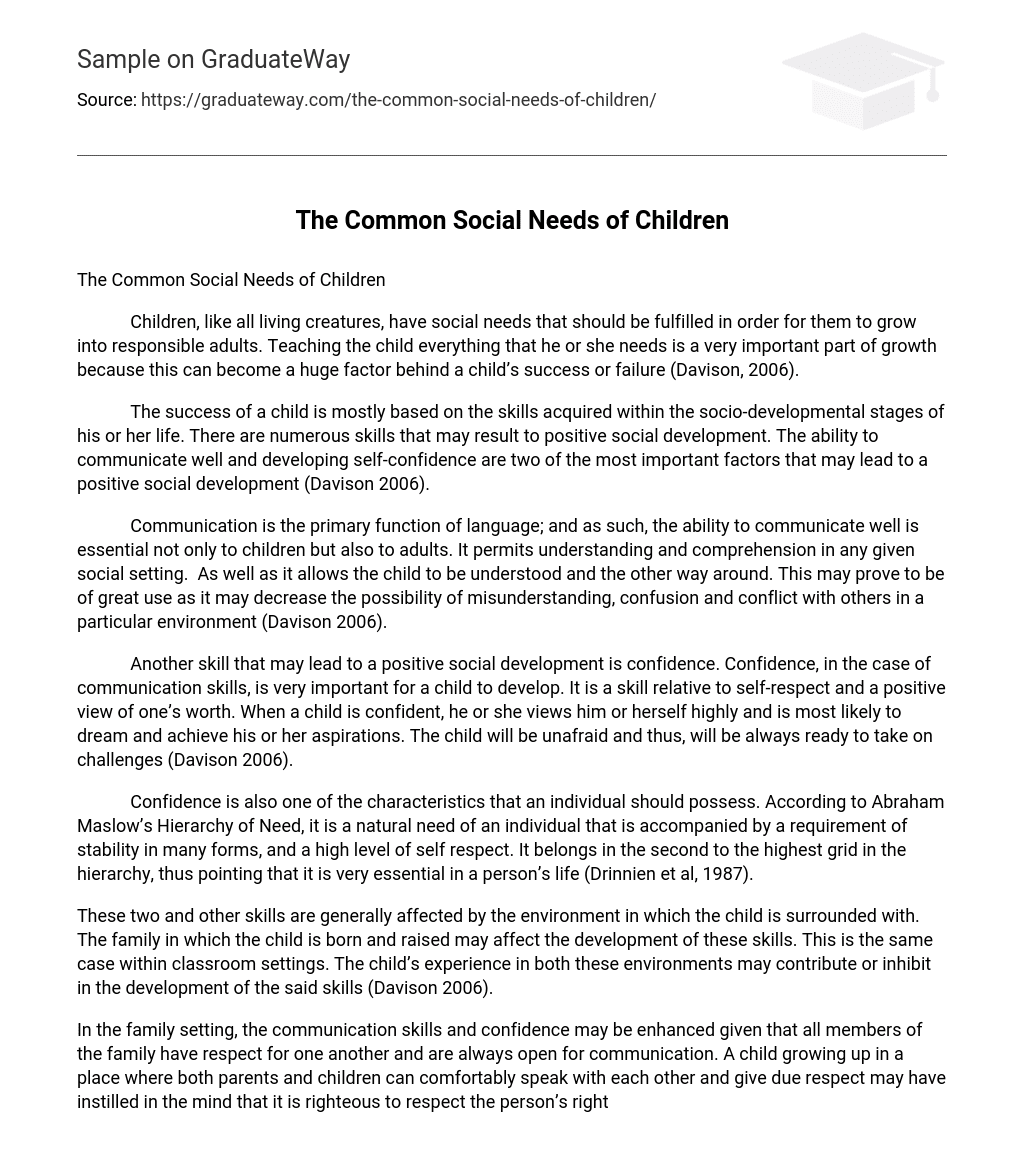Children, like all living creatures, have social needs that should be fulfilled in order for them to grow into responsible adults. Teaching the child everything that he or she needs is a very important part of growth because this can become a huge factor behind a child’s success or failure (Davison, 2006).
The success of a child is mostly based on the skills acquired within the socio-developmental stages of his or her life. There are numerous skills that may result to positive social development. The ability to communicate well and developing self-confidence are two of the most important factors that may lead to a positive social development (Davison 2006).
Communication is the primary function of language; and as such, the ability to communicate well is essential not only to children but also to adults. It permits understanding and comprehension in any given social setting. As well as it allows the child to be understood and the other way around. This may prove to be of great use as it may decrease the possibility of misunderstanding, confusion and conflict with others in a particular environment (Davison 2006).
Another skill that may lead to a positive social development is confidence. Confidence, in the case of communication skills, is very important for a child to develop. It is a skill relative to self-respect and a positive view of one’s worth. When a child is confident, he or she views him or herself highly and is most likely to dream and achieve his or her aspirations. The child will be unafraid and thus, will be always ready to take on challenges (Davison 2006).
Confidence is also one of the characteristics that an individual should possess. According to Abraham Maslow’s Hierarchy of Need, it is a natural need of an individual that is accompanied by a requirement of stability in many forms, and a high level of self respect. It belongs in the second to the highest grid in the hierarchy, thus pointing that it is very essential in a person’s life (Drinnien et al, 1987).
These two and other skills are generally affected by the environment in which the child is surrounded with. The family in which the child is born and raised may affect the development of these skills. This is the same case within classroom settings. The child’s experience in both these environments may contribute or inhibit in the development of the said skills (Davison 2006).
In the family setting, the communication skills and confidence may be enhanced given that all members of the family have respect for one another and are always open for communication. A child growing up in a place where both parents and children can comfortably speak with each other and give due respect may have instilled in the mind that it is righteous to respect the person’s right to express him or herself and to confidently express his or her own thoughts as well. This may further enhance the child’s chances to become successful in the future (Davison, 2006).
However, as there are qualities of a family that may enhance the development of positive skills, there are also those that inhibit it; oftentimes resulting to the development of negative skills and character traits. One quality of a family environment that can inhibit the development of communication skills, as well as decrease a child’s self-confidence, is a household where parents always quarrel. Quarrelling parents are not good subjects of emulation, since most of the time hatred for each other overshadows the respect that should be instilled within the child. This may bring about shy and timid child who incapable of self-expression (Davison, 2006).
The same case may be said in a classroom setting. Although the home setting affect the child’s development more, the classroom setting may also contribute to the development of positive skills. A teacher who treats children as a mental equal may instill in their minds that respect is essential to the development of communication skills and critical in viewing one’s self with due respect. In addition, children or classmates who do not tease or treat others without discrimination may also enhance and develop the positive skills of a child (Davison, 2006)
If a classroom is headed by a teacher with preconceived biases and holds no notion of respect for the children, those students will be more likely to develop negative skills in the course of his or her growth. As such, there is a great possibility that the development of the child’s communication skills will be hindered, as well as his or her confidence will be tarnished. Fear of the anger will keep children from expressing themselves and unequal treatment may instill a wrong notion of their self-worth (Davison, 2006).
Given such, it may be said that a child’s common social needs are affected by the environment wherein the child grows. Thus, this points out that outside factors may affect the future of a child. The actions and decisions made by a child may then be considered as something that is affected by the environment wherein the child has lived and grown up to.
References
Davison, B. 2006. The Common Social Needs of Children and Adolescents. Associated Content. Retrieved February 24, 2009 from http://www.associatedcontent.com/article/94978/the_common_social_needs_of_children.html?cat=4
Drinnien, B.A., Irwin, D.B, Simons, J.A. 1987. Psychology- The Search for Understanding. New York: West Publishing Company.





